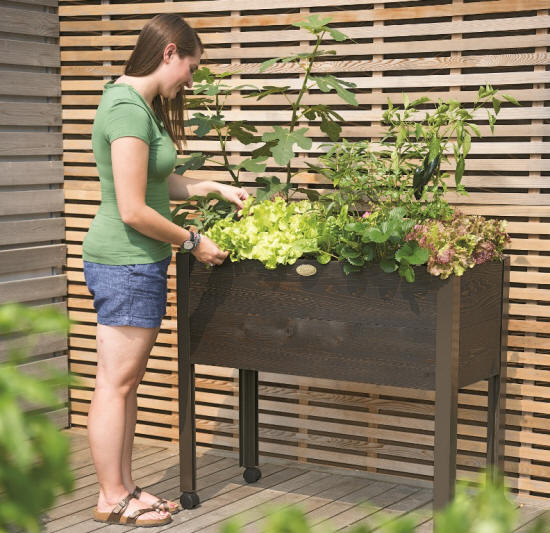|
 Reduce
Maintenance and Increase Success with Self-Watering Gardens Reduce
Maintenance and Increase Success with Self-Watering Gardens
By Melinda Myers
 Send a link to a friend
Send a link to a friend
[May 02, 2019]
Raised beds and containers expand our planting
options. They allow us to grow edible and ornamental plants even
where there is no plantable space to garden. Use them to make
planting, tending and harvesting convenient by bringing the garden
to your back door. And fill them with pollinator-friendly plants to
enjoy the colorful hummingbirds and butterflies that visit and flit
past the window, deck and balcony.
|
|
 Their need for frequent watering may have
discouraged you from growing in raised beds and containers. The
limited soil mass and increased exposure to wind, heat and sunlight
make fast-draining potting mixes dry out more quickly than in-ground
gardens. Their need for frequent watering may have
discouraged you from growing in raised beds and containers. The
limited soil mass and increased exposure to wind, heat and sunlight
make fast-draining potting mixes dry out more quickly than in-ground
gardens.
Self-watering raised gardens are now available, making these gardens
a realistic option; even for the busiest gardener. Consider one with
a large built-in water reservoir, like Gardener’s Corrugated Metal
Self-Watering Raised Bed, that extends time between watering.
Create mixed plantings of edibles and flowers for beautiful
combinations in raised beds. Include some edible flowers like
nasturtiums, pansies and calendulas that you, the hummingbirds and
butterflies will enjoy. Lettuce, parsley, kale, Swiss chard and red
cabbage combine nicely with most flowers and chives provide an
edible vertical accent. Select compact vegetable varieties like
Patio Choice yellow cherry tomato, Patio Pride peas, Mascotte bush
beans and Astia zucchini suited to container and raised bed culture.
And if concerned about maintaining the integrity of the patio or
deck surface consider a Patio Raised Bed with Base (gardeners.com)
that protects the underlying surface.

Elevated gardens raise your plantings to a comfortable height. No
bending or kneeling needed to plant, weed and harvest. These are
basically containers on legs. Many have wheels so you can move them
out of the way or into the sunlight as needed.
Look for those with built-in trellises and supports when growing
vines like cucumbers, pole beans and Malabar spinach and tall plants
like tomatoes, dinner plate dahlias and cosmos. But like containers,
they dry out more quickly than in-ground gardens and need frequent
irrigation.
[to top of second column] |

Look for easy care, self-watering containers like the
Self-Watering Standing Garden with large reservoirs to maximize the
time between watering. Look for those with fill tubes and
water-level indicators to help you determine when to water. These
features help keep your garden looking and producing its best.
You’ll have plenty of fresh greens for salads, herbs for seasoning
drinks and meals, and flowers to dress up your table.
Don’t fret if you already have a raised bed or elevated garden that
lacks these easy-care features. DIY irrigation kits are available
and easy to design for these types of gardens. Select systems that
allow you to customize and fit the irrigation layout to your
gardening needs.
Further reduce maintenance by incorporating a slow release
fertilizer at planting. These types of fertilizers release small
amounts of nutrients over a longer period of time. No weekly mixing
and applications needed. Just give them a mid-season boost if needed
and according to the fertilizer label.
Reducing ongoing maintenance of raised beds and container gardens
makes it practical to expand your gardening space. Just be sure to
fill them with a quality potting mix and plants suited to the
growing conditions and in no time, you’ll be enjoying the flavor and
beauty these gardens provide.
Melinda Myers has written more than 20 gardening books, including
Small Space Gardening. She hosts The Great Courses “How to Grow
Anything” DVD series and the Melinda’s Garden Moment TV & radio
segments. Myers is a columnist and contributing editor for Birds &
Blooms magazine and was commissioned by Gardeners Supply for her
expertise to write this article. Her web site is
www.MelindaMyers.com.
[Photo credit: Photo courtesy of
Gardener’s Supply Company] |